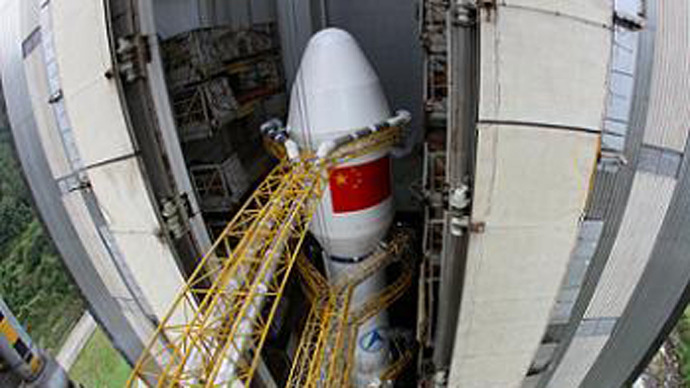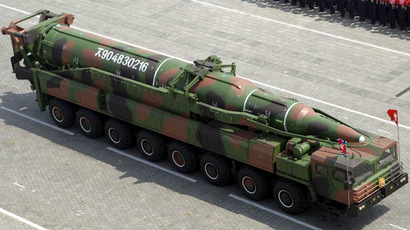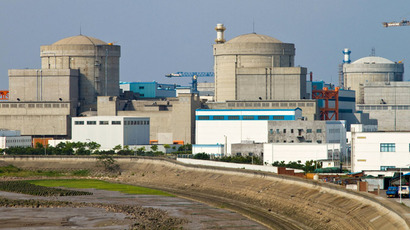Pentagon leaning on Chinese satellite for Africa Command communications

On the heels of a new presidential resolution for US government agencies to avoid Chinese IT hardware over security concerns, the Pentagon has sparked outcry by disclosing its lease of bandwidth from a Chinese satellite.
According to Pentagon spokeswoman Lieutenant Colonel Monica
Matoush, the US Africa Command has decided to lease space on the
Apstar-7 satellite, which is majority operated by China’s
state-owned Aerospace Science & Technology Corp via Hong
Kong-based APT Satellite Holdings.
The military contract has been active since 2012, when Department
of Defense contractor Harris CapRock Communications arranged the
$10.6 million one-year lease. That agreement is set to expire on
May 14, though the agency has the option to increase it by an
additional three years, according to Bloomberg Businessweek.
Via an emailed statement by Lt. Col. Matoush, both US Africa
Command and the Defense Information Systems Agency “made an informed risk assessment of
operational security considerations and implemented appropriate
transmission and communications security and information assurance
measures.”
According to Dean Cheng, a research fellow and veteran
China-watcher at the conservative Heritage Foundation who spoke
with Wired, the Apstar-7 satellite contract presents security
concerns for the US.
“I’m startled. Is this risky?
Well, since the satellite was openly contracted, they [the Chinese]
know who is using which transponders. And I suspect they’re making
a copy of all of it,” according to Cheng.
“This is giving it to them in a
nice, neat little package. I think there is a potential security
concern,” added Cheng.
In her emailed statement, Lt. Col. Matoush noted that the security
of “all signals to and through
the Apstar-7 satellite are fully protected with additional
transmission security.” The latter referring to the
encryption of US data.
The Pentagon’s contract peaked the curiosity of lawmakers in
Congress when it was disclosed on April 25 during a House Armed
Services Committee. As Bloomberg reports, Representative Mike
Rogers (R-Alabama), chairman of the panel overseeing space
programs, believes that the arrangement with the Chinese satellite
operator sends a bad message:
“[The contract] exposes our
military to the risk that China may seek to turn off our ’eyes and
ears’ at the time of their choosing,” said Rogers.
“It sends a terrible message to
our industrial base at a time when it is under extreme
stress,” he added.
Douglas Loverro, the Pentagon’s top space and satellite policy
official, informed the House panel that the Apstar-7 lease was the
only one available to fill an urgent “operational need, but we also recognize that
we need to have a good process in place to assure this” type of
decision “is vetted across the department.”
Steve Hildreth, a military space policy expert with the nonpartisan
Congressional Research Service, also told Bloomberg that
“a very high percentage of US
military communications use commercial satellites on a regular and
sustained basis.”
“The US military does not have
major concerns with this arrangement,” according to
Hildreth.
The “urgent” need quoted
by Loverro refers to the US military’s increasing reliance on data
uplinks for coordinating ground operations and drone
reconnaissance. Owing to a lack of capacity by military and
commercial satellites, apparently the Pentagon saw no choice but to
enact the agreement for use of the Apstar-7 satellite.
In 2012 China exceeded US satellite launches for the first time,
though American companies still owned the largest portion of total
satellites launched into orbit that same year.
Even if the Department of Defense can assure critics that the data
transmitted through the China-operated satellite can remain secure,
it’s likely to still attract outcry, demonstrating a fragmented
policy direction on the part of the US government.
In late March 2013, in a new government IT security measure, the US
Commerce Department, Justice Department, NASA and the National
Science Foundation were all directed to assess any risk with
equipment acquisitions manufactured or assembled by one or more
entities owned, directed, or subsidized by China.














